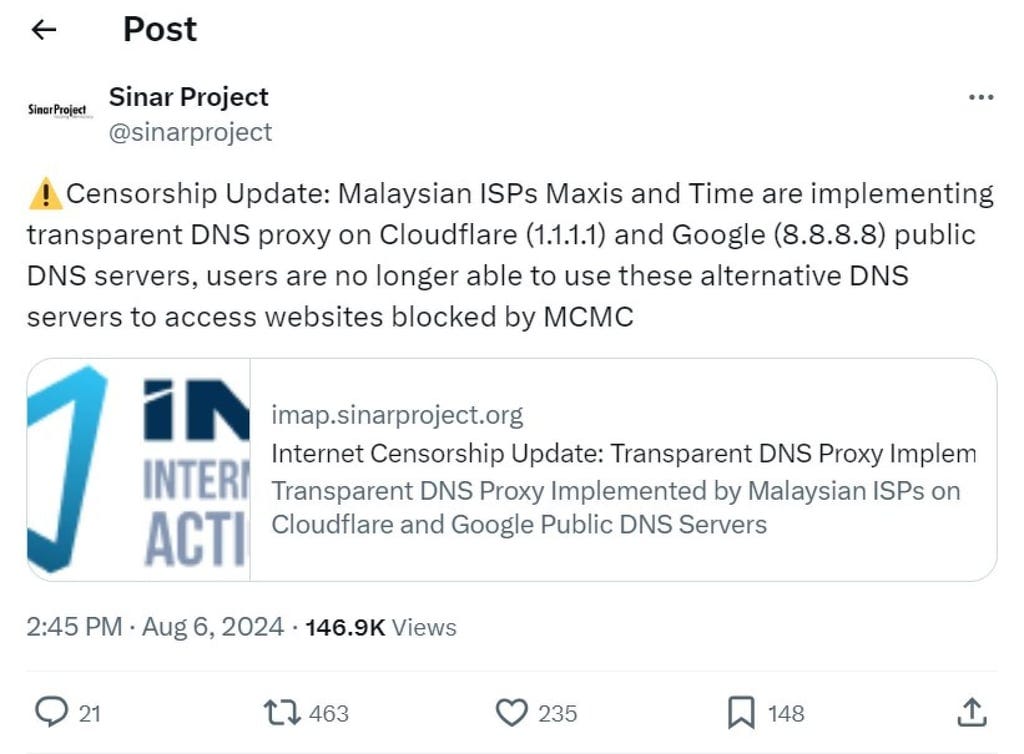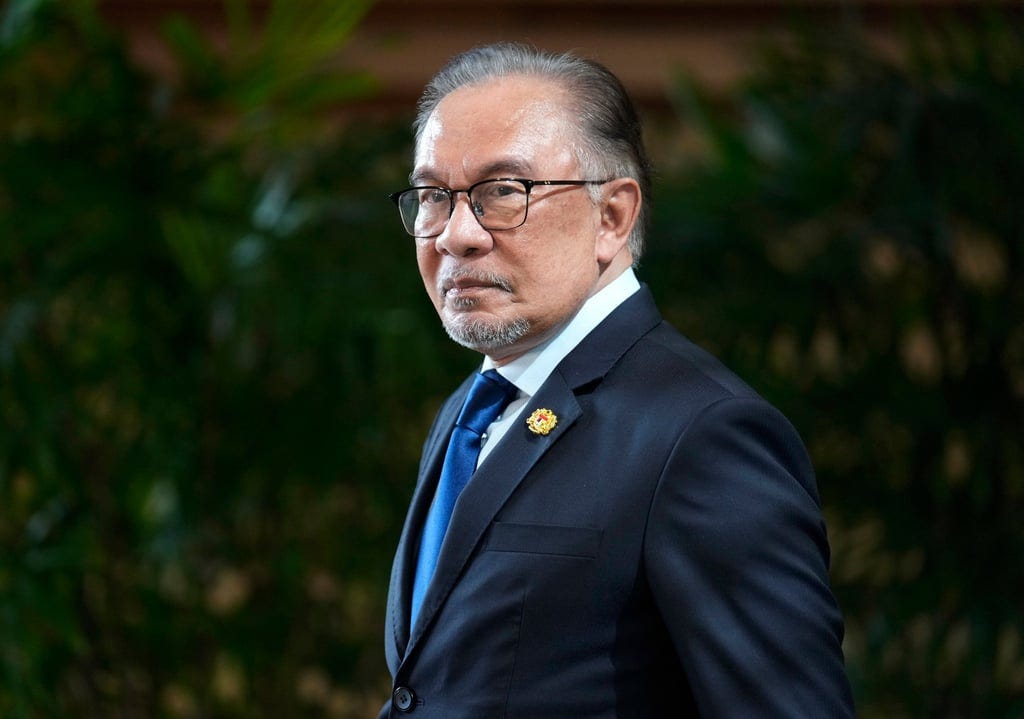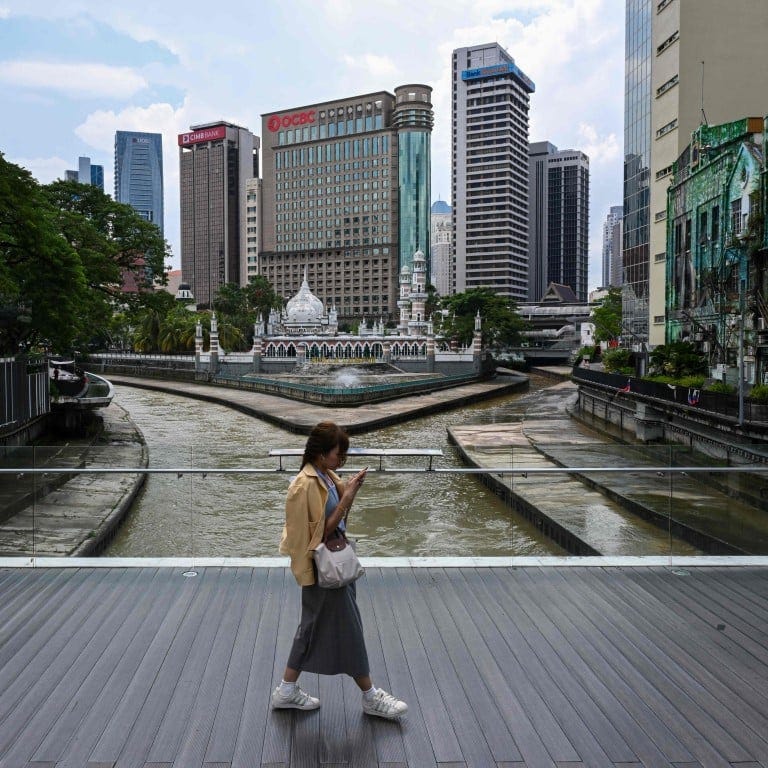SCMP: Malaysia tightens screws on internet access amid growing concerns about online freedom
Move to block alternative DNS servers means a slower and less secure connection for users, exposing them to data collection, analyst says
A woman checks her mobile phone in Kuala Lumpur. Two of Malaysia’s internet providers have blocked alternative DNS servers and rerouted traffic back through their own, effectively blocking certain websites deemed improper by the government. Photo: AFP
One of my reader’s comments was why don’t I make any comments on articles I post here? The reason I post other articles is to give a point of view that is not in the legacy media, and could potentially play a major role in events going on today. We don’t necessarily have to agree with all points of view. It’s important to understand them.
The article below in South China Morning Post by Hadi Azmi discusses censorship and the blocking of websites by the MCMC. This is following up on the report from iMAP I posted a couple of days ago. This article shows the extent of the MCMC operation.
By Hadi Azmi
The Malaysian government’s tightening of the screws on a key internet directory has heightened concerns over the state of online freedom in the country, following conflict between authorities and social media platforms amid efforts to impose licensing laws.
The move came just days after Prime Minister Anwar Ibrahim’s office expressed its “disgust” at social media giant Meta’s takedown of his message of condolences over the death of Hamas leader Ismail Haniyeh, prompting a meeting with platform representatives and an apology for the oversight.
On Tuesday, watchdog group Internet Monitoring Action Project (iMAP) reported that two of Malaysia’s internet providers had blocked alternative DNS servers – the internet’s “phone book” – and diverted traffic back through their own, effectively blocking certain websites deemed improper by the government.
Previously, users could sidestep their internet provider’s directory and use publicly available directories from Google or the network security firm Cloudflare to access any website, including those blocked at the behest of the Malaysian Communications and Multimedia Commission (MCMC).
“Users that have configured their Internet settings to use alternative DNS servers would have found that they are now unable to access websites officially blocked by MCMC and getting a connection timeout error,” iMAP said on its website.
In addition to Malaysia, iMAP monitors network interference and online restrictions on freedom of expression in Cambodia, Hong Kong, India, Indonesia, Myanmar, the Philippines, Thailand, East Timor and Vietnam.

Tevanraj Elengoe, founder of Malaysia’s largest tech community group DevMalaysia, said the move was damaging as it prevented Malaysians from using a more secure and private internet directory, exposed users to data collection, and slowed overall service.
“We used to have a secure connection between personal devices that increased privacy while providing improved performance that our [internet providers] can’t. These are mainly gone,” he told This Week in Asia.
The government recently mandated that social media platforms with more than 8 million Malaysian users must register for an operating licence in the country by New Year’s Eve or risk penalties.
While the government said it was concerned with the proliferation of child sexual abuse material, scams and cyberbullying online, iMAP’s report showed that the website of Murray Hunter, a Thailand-based blogger critical of the Malaysian government, was among the sites blocked.
Calling the DNS clampdown “a concerning development”, human rights lawyer and activist Eric Paulsen said MCMC had “no transparency and accountability” regarding takedown requests.
Paulsen said terms such as hate speech and fake news – used by MCMC in its takedown requests – had no accepted legal definition.
This is on top of the recently floated “3R” category of content touching on issues of race, religion and royalty, which Communications Minister Fahmi Fadzil has said needs to be weeded out.
“Since when is that set in stone? It’s just a convenient label to sweep everything ‘sensitive’ in the government’s eyes under the carpet, instead of dealing with disagreements like a mature democracy,” Paulsen said.

In a post on Facebook last month, Anwar said he was aware the restrictions being implemented were unpopular, but stressed they were “necessary for the well-being of the community”.
“I stress that the regulations on social media and internet messaging services that the government will soon introduce are to combat the spread of crime and harmful information, thus creating a safe virtual environment for all users,” he said.
Under Anwar’s stewardship, Malaysia fell 34 places to 107th in the World Press Freedom Index 2024 report released in May, down from 73rd last year.
Analyst James Chin from Tasmania University noted that while most Malaysians might agree platforms such as X and TikTok need to be reined in, the rules are not clear.
Malaysia topped a worldwide list of governments asking TikTok to remove content last year, filing more than 2,200 requests relating to over 6,000 pieces of online material from the platform.
“Civil societies are worried that the rules are not clear and that this allows for abuse of power,” Chin told This Week in Asia.
While Anwar’s administration had repeatedly affirmed that the law would not be abused to clamp down on freedom of speech, Chin said such reassurance was not enough.
“Once the law is passed, it is more or less permanent and can be abused [by] whoever comes to power,” he said.
Hadi Azmi is the Post's Malaysia Correspondent. Based in Kuala Lumpur, he covers Malaysian politics and current affairs. He has written for Bloomberg, The New York Times, and CNN.
Originally published in South China Morning Post 6th August 2024.
Subscribe Below:





Malaysians, especially their "educated" classes are angry and bitter at being exposed as a bunch of airheads who were bought and tricked by the NED, George Soros's Shadow government and Open Societies and their acolytes in these inutile organizations like Transparency International, C4, Bersih, the Malaysian Bar, G25 and the Malaysian Bar into believing Malaysia needed "more democracy and freedoms" and that Anwar would delliver on their political wet dream if and when he took the reins of Malaysia. He has.
Anwar promised reform. He is now reforming Malaysia. He realizes the mess that Malaysia turned into with the levels of democratic freedoms (disruptive street marches, lies and a mish mash of unverifiable rumours and lies spread by these so called pro democracy organizations for over 10 years) and the damage it has done to Malaysia's reputation and its economy.
He will now begin to round up the Elizabeth Wongs, the Teresa Koks, Ambigas, Marina Mahathirs, former presidents of the Malaysian Bar, the Raja Petra Kamaruddins, the Cynthia Gabriels and Terrence Gomez's all of them foreign funded and guilty of sedition and treason.
Malaysia has a majority Muslim population of mainly Malays. Much of the kind of reforms these so called NGO's (Regime Changers) have no mandate from anyone but the hands that feed them from abroad. They will now realize that there is no place to run nor to hide.
The US, the force behind most of these sinister individuals and the movements they belong to, is in trouble. The US is in an intractable, irreversible slide into a political black hole. Regardless of who wins the November general elections there it is done for. And their focus will no longer be on these side shows in the developing world they once funded.
In the end, Bangladesh, Thailand, Myanmar, Malaysia, Libya, Ukraine, Georgia, Tunisia, Egypt and a host of other nations that were tricked into the so called "pro democracy" movements will have to pay the piper for their indulgences and a seat at the table of Davos to sell their nations' silver to a bunch of greedy Westerners flush with cash.
The light they all saw at the end of the tunnel was the headlight of George Soros's and the West's runaway express train and not a light at the end of the tunnel. Too late to get out of the way.
Clampdowns like this are not just 'out of the blue' events. They are a response to what the government perceives as opposition. When was discussing the 3Rs ever as disruptive as it seems to be now? Life is deteriorating in Malaysia and trouble is brewing. The government knows it and these restrictions are only the beginning.